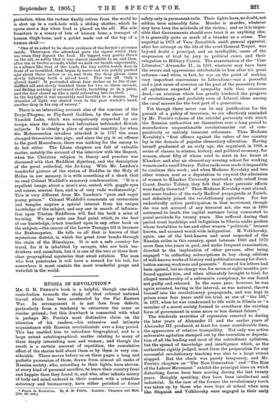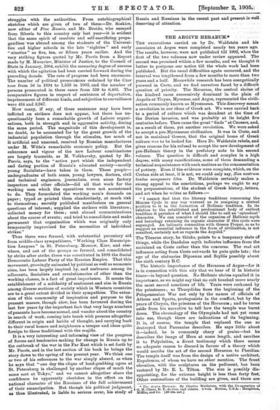Mn. G. H. FERRIS'S book is a helpful, though one-sided,
contribution towards the study of that colossal national travail which has been accelerated by the Far Eastern War. In arrangement it is not free from defects, particularly from a tendency to retraverse the same or similar ground; but this drawback is connected with what is perhaps Mr. Perria's most distinctive claim on the attention of his readers,—his extensive and intimate acquaintance with Russian revolutionists over a long period. This has enabled him to introduce biographical, and to a large extent autobiographical, matter relating to many of these deeply interesting men and women; and though the result is a certain amount of repetition, the cumulative effect of the stories told about them or by them is very con- siderable. There moves before us on these pages a long and pathetic procession of those, drawn from almost all ranks of Russian society, who, aceording to their lights, have striven, at every kind of personal sacrifice, to leave their country freer and happier than they found it, and who, after infinite misery of body and mind endured in their contest with a relentless autocracy and bureaucracy, have either perished or found
• Russia in Revolution. By G. B. Perris. London ; Chapman and Hall. [10s. 65. net.1
safety only in permanent exile. Their lights have, no doubt, not seldom been miserably false. Murder is murder, whatever may have been the misdeeds of the victim; and 'as it is impos- sible that Governments should ever treat it as anything else, it is generally quite as much of a blunder as a crime. The acquittal in 1878 of Vera Zassulitch amid general approval, after her attempt on the life of the cruel General Trepov, was lejond doubt a principal, and an intelligible, cause of the suspension of trial by jury in political cases, and their relegation to Military Courts. The assassination of the "Czar Liberator," Alexander II., in 1881, whatever may have been the errors and oppressions attributable to him after his great reforms—and when, in fact, he was on the point of making very important concessions to Liberalism—was a powerful and a just cause of aversion on the part of the peasantry from all agitators suspected of sympathy with that atrocious deed,—an aversion which has greatly hindered the progress of revolutionary, and probably even of Liberal, ideas among the rural masses for the best part of a generation.
Yet though there never can be any justification for the pursuit of a policy of terrorism, we are effectively reminded by Mr. Perris's volume of the suicidal perversity with which the Russian authorities set themselves over a long period to manufacture unquestionable revolutionaries out of com- paratively or entirely innocent reformers. Thus Madame Kovalsky's "first offence against the rulers of her country lay in the domain of popular elementary education. Having herself graduated at an early age, she organised, in 1868, a series of classes in science, history, and political economy, for women, about fifty of whom used to meet in her house at Kharkov, and also an elementary evening school for working women and a small library. Police raids soon made it impossible to continue this work ; and when Madame Kovalsky and two other women sent as a deputation to request the admission of women to Kharkov University received a rude rebuff from Count Dmitri Tolstoy, they felt that their patriotic efforts were finally thwarted." Then Madame Kovalsky went abroad, met some leaders of the early Radical propaganda at Zurich, and definitely joined the revolutionary agitation. For her undoubtedly active participation in that movement, though she was not accused of any terrorist act, she was in 1880 sentenced to death, the capital sentence being commuted to penal servitude for twenty years. She suffered during that period cruel hardships and indignities in Siberia under gaolers whose brutalities to her and other women " politicals " became known, and aroused world-wide indignation. M. Volkhovsky, again, one of the best-known and most respected of the Russian exiles in this country, spent between 1868 and 1872 more than two years in gaol, and under frequent examination, directed to the implication of other persons, after being engaged "in collecting subscriptions to buy cheap editions of well-known works of history and political economy for distri- bution among workmen and peasants." Some of his letters had been opened, but no charge was, for seven or eight months, pre- ferred against him, and when ultimately brought to trial, for alleged membership of a subversive conspiracy, he was found not guilty and released. In the same year, however, he was again arrested, having in the interval, as was natural, thrown himself into the revolutionary propaganda, and was kept in prison some four years until his trial, as one of "the 193," in 1877, when he was condemned to life exile in Siberia as "a member of a secret society formed to overthrow the existing form of government in some more or less distant future."
The wholesale severities of repression resorted to during the later years of Alexander II. and the earlier years of Alexander III. produced, at least for some considerable time, the appearance of relative tranquillity. Not only was active subversive agitation stamped out by the execution or deporta- tion of all the leading and most of the subordinate agitators, but the spread of knowledge and intelligence which, as the authorities rightly judged, must form the preparation for any successful revolutionary teaching was also to a large extent stopped. But the check was purely temporary, and Mr. Perria's chapters on "The New Generation" and "The Rise of the Labour Movement" exhibit the principal lines on which disturbing forces have been moving during the last twenty years. Roughly speaking, they have been intellectual and industrial. In the case of the former the revolutionary torch was taken up by those who were boys at school when men like Stepniak and Volkhovsky were engaged in their early struggles with the authorities. From autobiographical sketches which are given of two of them—Dr. Soskice, now editor of Free Russia, and Mr. Broido, who escaped from Siberia to this country only last year—it is evident that the same spirit of resolute and self-sacrificing propa- gandism was abroad among the students of the Universi- ties and higher schools in the late "eighties" and early " nineties " as five, ten, or fifteen years earlier. And the very striking figures quoted by Mr. Perris from a Report made by M. Muraviev, Minister of Justice, to the Council of State in January, 1904, exhibit the menacing degree of success with which the agitation had been carried forward during the preceding decade. The rate of progress had been enormous. The number of political prosecutions ordained by the Czar rose from 56 in 1894 to 1,533 in 1903, and the number of persons prosecuted in these cases from 559 to 6,405. The comparative figures in respect of sentences of deportation, imprisonment of different kinds, and subjection to surveillance were 484 and 3,947.
How• many, if any, of these sentences may have been inflicted on strikers does not appear, but there has un- questionably been a remarkable growth of Labour organi- sations, both in strength and in aggressive activity, during the same period. The magnitude of this development is, no doubt, to be accounted for by the great growth of the industrial population through the stimulus, too much of it artifleiall and unsound, received by Russian manufactures -under M. Witte's remarkable economic policy. But the coherence and -vigour of the new Labour combinations are largely traceable, as M. Volkhovsky, quoted by Mr. Perris, says, to the "active part which the independent and daring portion of Russia's educated society—mostly young Socialists—have taken in them. These people— undergraduates of both sexes, young lawyers, doctors, civil and technical engineers, journalists, even some factory inspectors and other officials—did all that work for the working men which the operatives were not accustomed to do. They formulated the working men's demands on paper; typed or printed them clandestinely, at much risk to themselves; secretly published manifestoes on general questions of interest; supplied the strikers with literature ; collected money for them; sent abroad communications about the course of events; and tried to consolidate and make permanent that organisation which was originally only temporarily improvised for the necessities of individual strikes."
Thus there were formed, with substantial pecuniary aid from middle-class sympathisers, "Working Class Emancipa- tion Leagues " in St. Petersburg, Moscow, Kiev, and else- where, and out of the groups so formed, and consolidated by strike after strike, there was constituted in 1898 the Social Democratic Labour Party of the Russian Empire. That this movement, growingly animated by political as well as economic aims, has been largely inspired by, and embraces among its adherents, Socialists and revolutionaries of other than the working classes, is a fact of great importance. It means the establishment of a solidarity of sentiment and aim in Russia among diverse sections of society which in Western countries are to a great extent divided in their sympathies. The exten- sion of this community of inspiration and purpose to the peasant masses, though slow, has been favoured during the last few years by the important fact that very large numbers of peasants have become nomad, and wander about the country in search of work, coming into touch with persons altogether different in origin and habits of thought, and carrying back to their rural homes and neighbours a temper and ideas quite foreign to those traditional with the mujiks.
It is a very interesting and informing view of the progress of forces and tendencies making for change in Russia up to the outbreak of the war in the Far East which is set forth by Mr. Perris, and in the last section of his book he brings the story down to the spring of the present year. We think one or two of his references to the war simply absurd, as when he says that "one day the clique of land-grabbing ogres at St. Petersburg is challenged by another clique of much the same sort at Tokyo," and we cannot altogether share the confidence he apparently cherishes in the effect on the national character of the Russians of the full achievement of their emancipation. But though his political judgment, I as thus illustrated, is liable to serious error, his study of
Russia and Russians in the recent past and present is well deserving of attention.



































 Previous page
Previous page